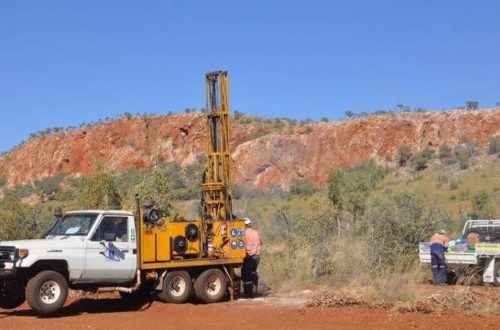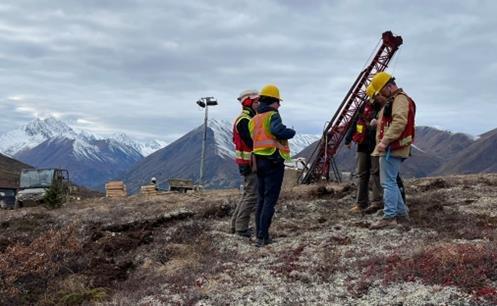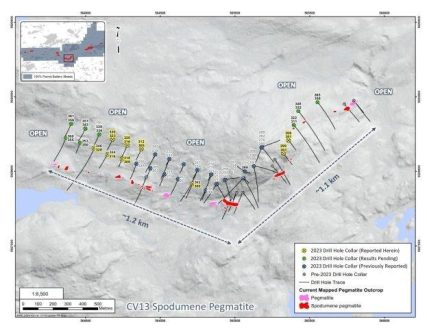
MAG Silver drills three new silver, gold and copper zones at Deer Trail
- DT22-11: 400 m north of Carissa discovery cut a 23.5 m zone of multiple stacked semi-massive sulfide mantos, the best of which grades 150 g/t Silver, 1.1 g/t Gold, 0.8% Copper, 4.9% Lead & 4.1% Zinc over 5.0 m.
- DT22-12: 800 m northwest of Carissa cut 33.0 m grading 0.6 g/t Gold encompassing four high-grade gold zones the best of which ran 6.1 g/t Gold over 1.5 m.
- DT22-13: 1.7 km southeast of the Carissa cut six strong copper-gold bearing structures, the best of which graded 2.2 g/t Gold and 2.1% Copper over 4.2 m.
“So far, every hole we’ve drilled within a 1.5 km by 3 km corridor has hit varying styles of gold, copper, and silver-lead-zinc mineralization within a thick package of intensely altered reactive carbonate rocks. These are all hallmark features of a large Skarn/CRD system and combine to point towards Deer Trail Mountain, where we are currently drilling, as the likely source,” said George Paspalas, MAG’s President and CEO. “With the Juanicipio Mine now in commercial production and quickly ramping up; these continued exploration successes and on-going drill programs should mean an exciting balance of 2023 and 2024 for MAG and its shareholders.”
Individual Hole Highlights:
DT22-11 – Carissita Manto Discovery: Hole 11 was drilled as a 400-800 m northerly offset of the Carissa discovery (see Press Release dated January 17, 2023) and cut a 23.55 m zone containing three high-grade semi-massive sulphide mantos (Table 1, Figure 1). This is the thickest manto-style mineralization intercept drilled by MAG to date and is clearly separate from those previously known. Importantly, these mantos were cut at relatively shallow depth (approximately 525 m down hole) within an interpreted upthrown block that brought prospective reactive carbonate host rocks closer to surface in the direction of the inferred source area beneath Deer Trail Mountain. Additionally, a 3 m thick zone of silver-mineralized skarn grading 156 g/t was intercepted at the contact with the felsic intrusive cut in all deep holes.
DT22-12 – 33 m Gold Zone: Hole 12 was drilled 800 m to the north of Carissa and under a similar topographic depression. It cut 33 m of weak manto alteration averaging 0.6 g/t Gold that encompasses at least four narrow high-grade gold-bearing structures, the best of which ran 6.1 g/t Gold over 1.5 m (Table 1, Figure 1). The overall zone appears to line up with a similar zone intercepted about 175 m to the southeast in DT20-01. It also cut 10.5 m of 0.26% copper skarn just above the contact with the felsic intrusive cut in all deep holes.
DT22-13 – Multiple Gold-Copper Zones: Hole 13 targeted the intersection of the Cottonwood Creek and Tushar Faults and a significant coincident Magnetic anomaly (Figure 2). It cut multiple structurally controlled copper-gold zones within a thick package of intensely altered carbonate dominant host rocks (Table 1) on the south side of the Cottonwood Creek Fault. The best intercept is a 4.25 m wide (core length) structure grading 29 g/t Silver, 2.2 g/t Gold, and 2.1% Cu starting at 1060.60 m downhole. Calcite veining and brecciated calcite showing strong red fluorescence under short-wave ultraviolet light occur throughout the hole, including within the mineralized intercepts. This is indicative of “fugitive calcite”, the “exhaust” of the sulphide replacement mineralization process.
Summary: The results from these three holes have at least five significant implications and further support the company’s belief that Deer Trail shows the key features of a major CRD/Skarn system.
1. The distinctive metal assemblages present in all MAG-drilled holes support MAG’s thesis that Deer Trail contains a large, multi-stage mineral system.
2. The high copper values in Hole 13, combined with previously released Cu-rich intercepts, may indicate that the source intrusion being sought in Phase 3 drilling is a copper-rich.
3. The interpreted upthrown block cut in the Carissa-Carissita zone brought prospective reactive and mineralized carbonate host rocks closer to the surface in the direction of the inferred source area beneath Deer Trail Mountain.
4. Significant mineralization continues south of the Cottonwood Creek Fault, expanding known mineralization to a 3 km by 1.5 km area-that remains open in all directions.
5. Numerous historical polymetallic showings and small mines are hosted in favorable carbonate rocks that crop out within MAG’s extensive ground holdings farther south of the Cottonwood Creek Fault indicating the system remains open in that direction. Hole 13 confirms that there is significant thickness to these rocks south of the Cottonwood.
Systematic Property Wide Exploration
MAG is built on systematic science-based exploration, big picture thinking, and applying cutting-edge technology to understanding the processes active in given structural and lithologic environments to concentrate mineralization into large, high-grade deposits. Once MAG consolidated the Deer Trail properties, regional mapping, sampling, hyperspectral and geophysical programs were run to identify the source of the extensive mineralization and alteration known throughout the property. Modern concepts and techniques have been combined with decades of historic surface exploration into an integrated district-scale geological, geochemical, and geophysical dataset. Numerous high priority targets have been developed and include the Deer Trail Mountain and Mt. Brigham porphyry targets; follow-up drilling on the best holes drilled to date (c.f. the Carissa and new Carissita Mantos of this release); and several other CRD targets throughout the property.
Phase 3 Drilling
MAG has started Phase 3 drilling of up to three holes targeting porphyry “Hub” targets interpreted to underlie Deer Trail Mountain and Mt Brigham where the source of the manto, skarn and epithermal mineralization and extensive alteration that characterize the Project area is interpreted to lie.
About Deer Trail
The silver-rich Deer Trail Carbonate Replacement Deposit “CRD” project in Piute County, Utah (the “Deer Trail Project” or “Project”) includes both patented and unpatented claims (approximately 7,250 Ha) in the historic Deer Trail Mine and the adjoining Alunite Ridge area. The property lies directly on the Tushar strand of the Wasatch-Tushar Fault, the major 100 km wide structural zone separating the Great Basin from the Colorado Plateau. Farther north, this same fault system hosts the Tintic and Bingham Canyon CRD-Skarn-Porphyry districts. Age dates from all three systems fall around 28-35Ma, suggesting metallogenic affinity.
MAG has consolidated the Deer Trail properties for the first time since the early 1980s, allowing application of an integrated district-scale exploration approach based on the CRD through Skarn to Porphyry Copper-Molybdenum continuum of mineralization styles shown by many related systems worldwide. This model suggests that the high-grade silver, gold, lead, zinc, and copper CRD sulphides of the Deer Trail mine are linked by kilometers of continuous mineralization to a Porphyry Copper-Molybdenum centre lying to the west under Deer Trail Mountain or Mt. Brigham. The system’s plumbing framework was outlined through detailed core relogging and underground mapping, which were combined into a detailed 3D model of potential “bleeder” structures connected to potentially larger deposits below the historic Deer Trail Mine. The Deer Trail Project team is led by Dr. Lex Lambeck an A.I.P.G. Certified Professional Geologist with over 15 years of relevant experience in CRD exploration.
Quality Assurance and Control: The samples (half core) are shipped directly in security-sealed bags to ALS- Laboratories preparation facilities in Elko, Nevada, USA (Certification ISO/IEC 17025:2017). Samples shipped also include intermittent standards and blanks. Pulp samples are subsequently shipped to ALS-Chemex Laboratories in North Vancouver, Canada for analysis. The remaining half core is placed back into the core boxes and is stored on site with the rest of the drill hole core in a secured core storage facility.
Qualified Persons: Dr. Peter Megaw, Ph.D., C.P.G. and Lyle Hansen, M.Sc., P.Geo have acted as the Qualified Persons as defined in National Instrument 43-101 for this disclosure and supervised the preparation of the technical information in this release. Dr. Megaw has a Ph.D. in geology and more than 40 years of relevant experience focussed on silver and gold exploration in Mexico. He is a Certified Professional Geologist (CPG 10227) by the American Institute of Professional Geologists and an Arizona Registered Geologist (ARG 21613). Dr. Megaw is not independent as he is Chief Exploration Officer and a shareholder of MAG. Dr. Megaw is satisfied that the results are verified based on an inspection of the core and underground exposures, a review of the sampling procedures, the credentials of the professionals completing the work and the visual nature of the silver and base metal sulphides within a district where he is familiar with the style and continuity of mineralization. Mr. Hansen is a registered Professional Geologist with Engineers and Geoscientists BC (149624) and has more than 15 years experience in epithermal veins and CRD deposits. Mr. Hansen is not independent as he is Geotechnical Director of MAG.
About MAG Silver Corp. (www.magsilver.com)
MAG Silver Corp. is a growth-oriented Canadian exploration company focused on advancing high-grade, district scale precious metals projects in the Americas. MAG is emerging as a top-tier primary silver mining company through its (44%) joint venture interest in the 4,000 tonnes per day Juanicipio Mine, operated by Fresnillo plc (56%). The mine is located in the Fresnillo Silver Trend in Mexico, the world’s premier silver mining camp, where in addition to underground mine production and processing of high-grade mineralised material, an expanded exploration program is in place targeting multiple highly prospective targets. MAG is also executing multi-phase exploration programs at the Deer Trail 100% earn-in Project in Utah and the 100% owned Larder Project, located in the historically prolific Abitibi region of Canada.
For further information on behalf of MAG Silver Corp.
Contact Michael J. Curlook, Vice President, Investor Relations and Communications
Phone: (604) 630-1399 Website: www.magsilver.com
Toll Free: (866) 630-1399 Email: info@magsilver.com
In Europe:
Swiss Resource Capital AG
Jochen Staiger & Marc Ollinger
info@resource-capital.ch
www.resource-capital.ch
Neither the Toronto Stock Exchange nor the NYSE American has reviewed or accepted responsibility for the accuracy or adequacy of this press release, which has been prepared by management.
This release includes certain statements that may be deemed to be “forward-looking statements” within the meaning of the US Private Securities Litigation Reform Act of 1995 or “forward-looking information” within the meaning of applicable Canadian securities legislation (collectively, “forward-looking statements”). All statements in this release, other than statements of historical facts are forward looking statements, including statements that address future mineral production, reserve potential, exploration drilling, exploitation activities and events or developments. Forward-looking statements are often, but not always, identified by the use of words such as "seek", "anticipate", "plan", "continue", "estimate", "expect", "may", "will", "project", "predict", "potential", "targeting", "intend", "could", "might", "should", "believe" and similar expressions. These statements involve known and unknown risks, uncertainties and other factors that may cause actual results or events to differ materially from those anticipated in such forward-looking statements. Although MAG believes the expectations expressed in such forward-looking statements are based on reasonable assumptions, such statements are not guarantees of future performance and actual results or developments may differ materially from those in the forward-looking statements. Factors that could cause actual results to differ materially from those in the forward-looking statements identified herein include, but are not limited to, a subsequent change in the Company’s approach to executive compensation from that approach approved by Shareholders, failure of the Company to receive approval from the Toronto Stock Exchange of the renewal of the unallocated entitlements under the Plans, changes in applicable laws, continued availability of capital and financing, and general economic, market or business conditions, political risk, currency risk and capital cost inflation. In addition, forward-looking statements are subject to various risks, including those risks disclosed in MAG Silver’s filings with the Securities Exchange Commission (the “SEC”) and Canadian securities regulators. All forward-looking statements contained herein are made as at the date hereof and MAG Silver undertakes no obligation to update the forward-looking statements contained herein. There is no certainty that any forward-looking statement will come to pass, and investors should not place undue reliance upon forward-looking statements.
Please Note: Investors are urged to consider closely the disclosures in MAG’s annual and quarterly reports and other public filings, accessible through the Internet at www.sedar.com and www.sec.gov.
Swiss Resource Capital AG
Poststrasse 1
CH9100 Herisau
Telefon: +41 (71) 354-8501
Telefax: +41 (71) 560-4271
http://www.resource-capital.ch
CEO
Telefon: +41 (71) 3548501
E-Mail: js@resource-capital.ch
![]()





